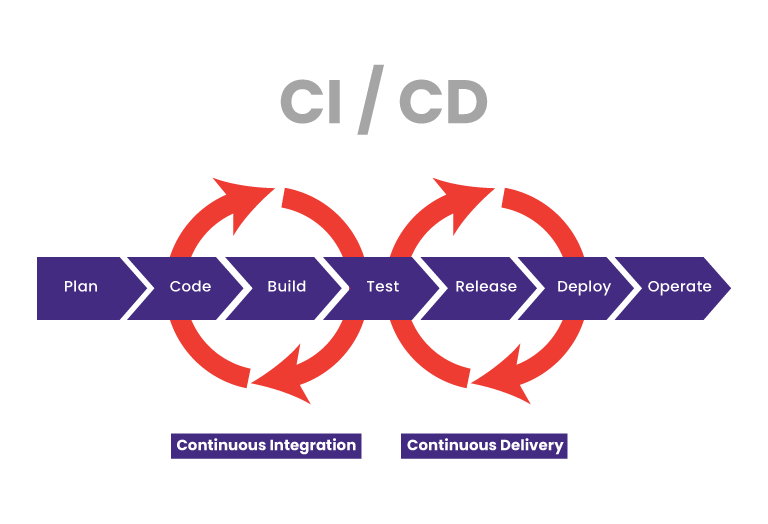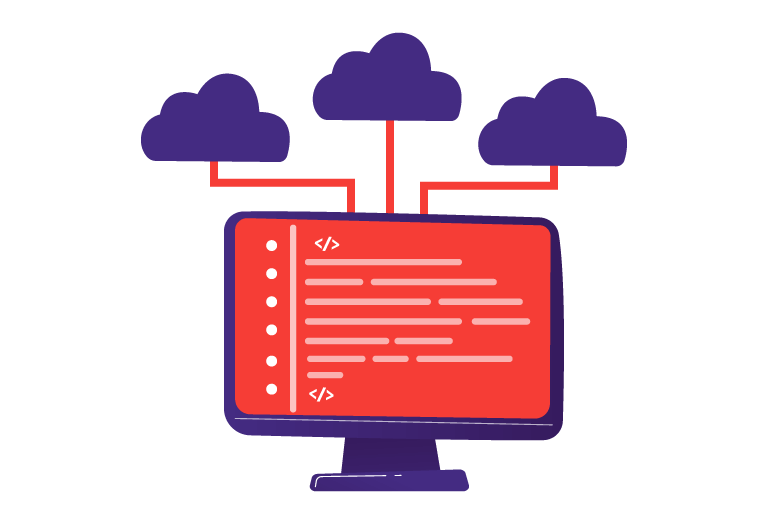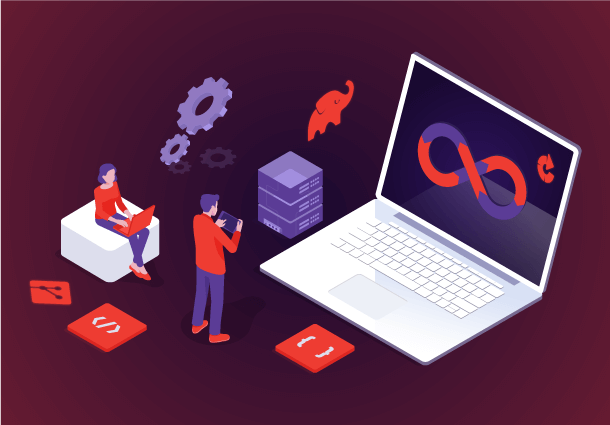The Successful Entrepreneur’s Guide
to DevOps
DevOps isn’t surreal but isn’t as easy as it looks from the outside. Several companies have gone down the path to experiment with DevOps to bring their software development team and IT operations team together. And have achieved a good share of profitability and productivity by shortening the time to their market. But again, think of your competitors implementing the same DevOps strategy and pulling you down in the race. You cannot afford that to happen. So, how do you develop a DevOps team who works towards a single goal of achieving success together? How do you strike the perfect balance between the workflows of QA, Ops engineers, and Devs? Today’s blog is in favor of this discussion so that you get to the amazing destination that DevOps is.
DevOps to Lead the Charge: Duties and Responsibilities
DevOps framework is more like stringing together a lot of processes so that the entire software development achieves a greater velocity. Instead of just throwing it over the wall just like that,  let’s take a closer look at the processes that make a successful launch of a product. First of all, the DevOps team takes care of the infrastructure planning followed by development and testing. The next and most important one would be to optimize a CI/CD pipeline constantly for any further improvements. In a DevOps context, shifting CI/CD left is a mark of delivering high-quality software frequently and predictably. Then comes automation which lies at the heart of DevOps. The whole automation process begins from the moment the code is generated in the developer’s machine and throughout the DevOps pipeline with CI/CD and continuous testing. Automation also comes in handy when the team needs to monitor the performance of the app live. This lets the team dedicate mundane tasks to perform automatically, while also maintaining delivery over a short period of time across different platforms. Lastly, the DevOps team is also responsible for figuring out any blind spots in their infrastructure and equally responding to incidents in their products as much as they are engaged in building them.
let’s take a closer look at the processes that make a successful launch of a product. First of all, the DevOps team takes care of the infrastructure planning followed by development and testing. The next and most important one would be to optimize a CI/CD pipeline constantly for any further improvements. In a DevOps context, shifting CI/CD left is a mark of delivering high-quality software frequently and predictably. Then comes automation which lies at the heart of DevOps. The whole automation process begins from the moment the code is generated in the developer’s machine and throughout the DevOps pipeline with CI/CD and continuous testing. Automation also comes in handy when the team needs to monitor the performance of the app live. This lets the team dedicate mundane tasks to perform automatically, while also maintaining delivery over a short period of time across different platforms. Lastly, the DevOps team is also responsible for figuring out any blind spots in their infrastructure and equally responding to incidents in their products as much as they are engaged in building them.
6 Major Roles and Responsibilities Of DevOps
It’s not only important to understand the running around processes in a DevOps team, but the dependencies that all these activities have on the skilled workers. After all, what is a DevOps framework without its people? Here’s a list of six roles and responsibilities of DevOps with the right skills that your organization needs to gather for a highly fluid DevOps network.
1. The DevOps Evangelist
The DevOps Evangelist is someone who leads the charge, a person who takes ownership of a DevOps team and exploits the maximum out of its capabilities. A change in the software development cycle cannot happen overnight, so the DevOps evangelist participates in functions like acquiring the best DevOps practices to boost productivity, buy-in from development and operational teams, ensuring the training of other professionals to empower them, and so on. He/She maintains a good rapport with all the teams involved in the process of development to delivery. As you see, having a DevOps Evangelist is equal to having an excellent leader in place.
2. The Release Manager
The role of a release manager in your DevOps is similar to that of a project manager. It is their job to oversee the management and coordination of the entire process from development to production. They look into the fact that every project meets its objectives in terms of cost, schedule, quality, and scope. The responsibility handled by a Release Manager also needs to cross hurdles like setting a product release map, and plans, and figuring out dependencies by coordinating with the other professionals in the team. As the name suggests, a release manager is in charge of every new release that the DevOps team makes.
3. Automation Architect
Since Automation plays an integral part in DevOps, a team without an Automation Architect is almost unimaginable. Their job is to make sure that innovative DevOps automation ideas and solutions are developed to maintain the product architecture on CD pipelines. They work seamlessly across all DevOps tools and cloud platforms to create an extremely reliable environment that is free from hurdles. And this is achieved through complete automation.
4. DevOps QA Engineer
How do you certify that your new release has functionalities that perfectly match the end-users expectations? A range of test cases must be created that will identify the defects to ensure that the product aligns with the expected outcomes. This process is taken over by the Quality Assurance Engineer who analyses the Unique Selling Point, Architecture, and Requirements to review the quality of the products under test. Moreover, the QA Engineer of your DevOps will go the extra mile to review the test designs with the entire team for feedback so that they add some more test cases.
5. Security Engineer
In the case of security, DevOps takes a deviation from the traditional method of software development. In place of what was considered to be a task that was an afterthought, the DevOps security system starts working way earlier when the implementation plan is set up. And who takes care of it? The Security Engineer! They do not wait until the problem outgrows into a headache, instead fix them during the early stages of engineering. Their expertise and recommendations go hand-in-hand while the product passes through the delivery and development process.
6. DevOps Developer
The DevOps Developer is the technology partner of your customers who translate their requirements into effective software solutions. He/She is entrusted with building a runnable software code that is delivered bug-free to your prospective customers. Additionally, they also employ themselves to do unit testing, deployment, and constant monitoring. In fact, the Developer is the backend genius of your DevOps team.
The 5 Building Blocks of a Solid DevOps Team
With the individual member devops roles and responsibilities covered, we now move to understand some core principles that you need to adopt if a proactive DevOps is your dream. Even though different organizations run on different specifics the foundation of a DevOps team will constitute the same ingredients.
Finding and Retaining the Right Talent
Can this sound any more challenging? Save for DevOps, finding and retaining professionals in any sphere has been back-breaking. But catching hold of the right individuals like the one we just looked at will take your DevOps one step ahead from infancy. Just because the right workforce can only contribute to long-term change. It’s not a matter of hunting for specialized professionals, but someone who is well-rounded and a generalist. A person who can swing from the back end to the front end and accelerate the team dynamics to the next level. Think of a DevOps team where the members are a jack of all trades but masters of none. Very pleasing isn’t it?
Exposure to Tools and Training
This is closely connected to retaining the talented lot of your DevOps team. Give them brand-new technologies and methodologies to create and innovate so that they do not feel run down. After all, who does not appreciate a change by breaking old habits? Along with the advanced DevOps development toolchain, they also get an opportunity to grow limitlessly. Now, talking of other kinds of exposure in a DevOps team, it’s important that you try to integrate the development and the operations team with each step. When either of the departments are familiar with the systems of one another, they become stronger in identifying issues and remediating any incident.
Encourage Collaboration
Arguably, experts in this field believe that a resilient DevOps software development team is a combination of People, Processes, and Products. And this cannot be more true. Collaboration through constant communication is essential during both product development and the software delivery cycle. The team should be ready to adapt to any new situation and find better ways to discuss progress together. Such a team will tackle issues rapidly and build better applications. One of the ways to ensure collaboration between IT professionals and developers is by conducting regular standup meetings. As a result, the team members get an idea of what the other teams are heading to, permit/offer suggestions and insights to improve processes, paying attention to continuous improvement. For instance, you could also test run a new model with the participation of people from each team so that they together work and understand the negative parts of it.
Thoughtful Automation
Although a major part of your DevOps software development relies on Automation, you need to figure out how this can be used to address the existing pain points of your developers and IT teams. In other words, instead of creating new processes automation should streamline those they are already burdened with. Look into the aspects and tasks that can be automated so that it frees the time of your workforce for building new features and services. DevOps Automation is part of good development practices and will surely define the future of your organization.
Monitoring the existing Team Structure
Just as important as it is to form a strong DevOps team, it’s necessary to measure their effectiveness too. The easiest way of doing this is by looking at the Key Performance Indicators (KPIs). This will help you pick the drawbacks, areas of friction, and steps to promote teamwork among members. One of the ways to evaluate their performance is by measuring the Deployment frequency. This means you keep a check on the number of deployments carried out each day. Secondly, you can also keep a record of the bugs and incompatibility issues that every new code generates. Last but not the least, you must ensure that your application is free of malware or any kind of threats with regular swapping and updations of plugins. When new features are added you do not want your product to turn vulnerable to attacks.
Fast Forwarding to the Future of DevOps
If businesses are innovating today or are up for any sort of innovation in the future, cloud computing is the catalyst for accelerating the process. With Data and Analytics migrating to the clouds, can there be any better option than to succumb to this digital transformation for your DevOps too? Since the cloud has only eased the amount of work, it’s going to be a game-changer that brings a dramatic shift to DevOps. But cloud computing is not to be taken lightly. As DevOps forms a link between two arms of the product development cycle, chances are more that software will be pushed into multiple clouds making the task even more tiresome. However, this shouldn’t stop your team from leveraging the asset that cloud computing is. Instead, DevOps professionals should adapt to the cloud environment, understand its maturing capability and respond to get the best out of it. Once the cloud platform’s native features are given a good study, these professionals may communicate it to the rest of the team. Soon enough the cloud infrastructure will act as the power behind the throne in your DevOps software development so that the team dedicates more time to efficient innovations and managing large clusters of complex apps across tech stacks. Together with this, multi-cloud management also minimizes downtime redundancy, avoids vendor lock-in, prevents data losses, and much more on the list. And it’s not surprising that what DevOps has for the future is also tightly knit to cloud computing in every way.
it’s going to be a game-changer that brings a dramatic shift to DevOps. But cloud computing is not to be taken lightly. As DevOps forms a link between two arms of the product development cycle, chances are more that software will be pushed into multiple clouds making the task even more tiresome. However, this shouldn’t stop your team from leveraging the asset that cloud computing is. Instead, DevOps professionals should adapt to the cloud environment, understand its maturing capability and respond to get the best out of it. Once the cloud platform’s native features are given a good study, these professionals may communicate it to the rest of the team. Soon enough the cloud infrastructure will act as the power behind the throne in your DevOps software development so that the team dedicates more time to efficient innovations and managing large clusters of complex apps across tech stacks. Together with this, multi-cloud management also minimizes downtime redundancy, avoids vendor lock-in, prevents data losses, and much more on the list. And it’s not surprising that what DevOps has for the future is also tightly knit to cloud computing in every way.
The Future Shows No Compromise on Automation
Automation for the future of DevOps would mean that it will be continuous, optimal, on-demand, and contextual. To be specific, the DevOps structure can be revamped and updated even when the developers deliver the product to their users. As both the DevOps and automation industry is expanding across horizons, it’s important that the right DevOps automation tools are chosen with balanced features- one that automates and also needs the gentle touch of an engineer. But at the same time, you need to take care not to automate too much which will end up causing friction in team communications. Automation also gets a lot simpler with cloud-based applications.
Learning to Code Will be the Need of the Hour
Out of the skills that play a crucial role in software development, learning how to code and automate scripts is a must. This is carried out so that the development process overcomes the time consumed during manual testing. If a tester cannot run the test cases to ensure that each function is doing what it is supposed to do, then he/she is doomed. One who is capable of writing code is also creating a protective cover for their applications against cyberattacks because they are constantly integrating new improvements into their code and making the system stronger and less vulnerable.
Security will be a Top Priority
As we have already seen, DevOps include the automation of CI/CD pipelines which undergo rapid changes. When this happens, security is put into question and therefore should be brought into the forefront and integrated into the software design itself. For all obvious reasons, you cannot allow security pitfalls to wreak havoc on systems and have long-term effects on the development cycle. So, it’s way forward will definitely go for DevOps tools for detection, correction, and prevention wrapped in the CI/CD pipeline before it reaches the production phase. Years later, you will see security and privacy are something that defines our very existence.
Count on Pattem Digital for world-class DevOps Development Services!
If you are eager about bridging the gap between software development, IT operations, and QA of your organization, then we are here to accelerate your DevOps journey. Pattem Digital Technologies reduces your deployment risks through continuous improvement of DevOps structures with matchless quality of products. With our Devops services, we go one step ahead in making your technology future-proof through mature cloud-based frameworks too. Why keep your projects waiting? Get in touch to start right away!


